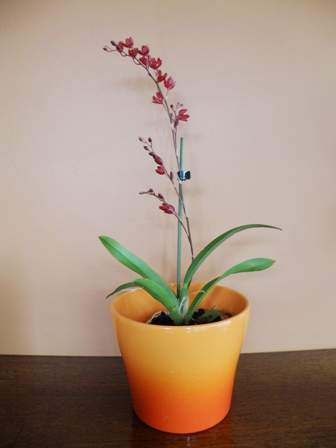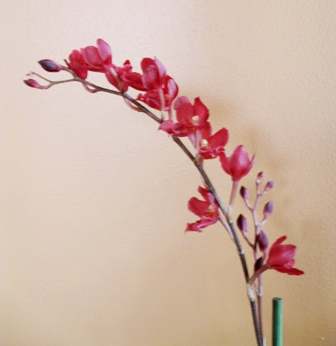Caring for your Howeara orchids
This hybrid, which comes from crossing three different genera of orchids, is becoming easier to find in the bigger garden centres and nurseries in the UK that have wider ranges of orchid pot plants for sale.

Howeara orchids are hybrids plants from the Oncidium, Leochilus and Rodriguezia genera. The result are small plants with narrow deep green leaves that produce branched stems of dark red flowers which number up to 20 blooms per branch. The flowers last up to nine weeks

They make good house plants requiring temperatures of 20 - 25 degrees C during the day and that do not drop below 16 degrees C at night. Like many orchid pot plants they prefer good levels of indirect light. A window ledge that receives direct sun will cause the leaves to bleach, blister and die. As for watering Howearas require more frequent watering than some other orchids - every three to five days in a warm room, but they should not sit in a saucer of water. As the compost starts to dry out, immerse and then drain the pot before placing it back in its outer pot or saucer.
Weak fertiliser can be applied to promote growth and flowering. Mature plants can flower up to three times during a year. Medium grade orchid compost that drains easily is ideal for these plants, and they should be repotted every couple of years.
Watering your orchid pot plants
By far the best way to water evergreen orchids is to place them in a sink or other container of lukewarm water which comes up to the top of their pots. Because they are not growing in densely packed soil or compost, the water will easily rise up from the bottom of the pots and saturate the roots. The plants should be left for several hours, or overnight, and the watering should be repeated on a weekly basis (although most plants will easily survive a 10 interval if you are away). At the same time as watering, spray the leaves with a fine water mist. Feeding should be kept to a minimum and stepped up only once new growth or flower shoots appear. Never overdo it – food is not high on the agenda of survival for plants that live perched up in trees with their roots exposed!
What about our native wild orchids?
Yes, we have many native wild orchids throughout Europe and around 30 species in the UK. Most of them are rare, endangered or in serious decline due to the destruction of their natural habitats. They will not survive being dug up and moved either to gardens and greenhouses or to window ledges. It is also an offence under the Wildlife and Countryside Act to dig up any wild plants without the landowner’s consent.
Please Help Us: If you have found this information interesting and useful, please consider helping to keep First Nature online by making a small donation towards the web hosting and internet costs.
Any donations over and above the essential running costs will help support the conservation work of Plantlife, the Rivers Trust and charitable botanic gardens - as do author royalties and publisher proceeds from books by Pat and Sue.
Where to see wild orchids
There are many local and national nature reserves where wild orchids can be seen at the right time of year, and the network of local Wildlife Trusts can advise you on the best time to visit and also arrange for you to take part in some of the many tours that they organise during peak flowering times.


